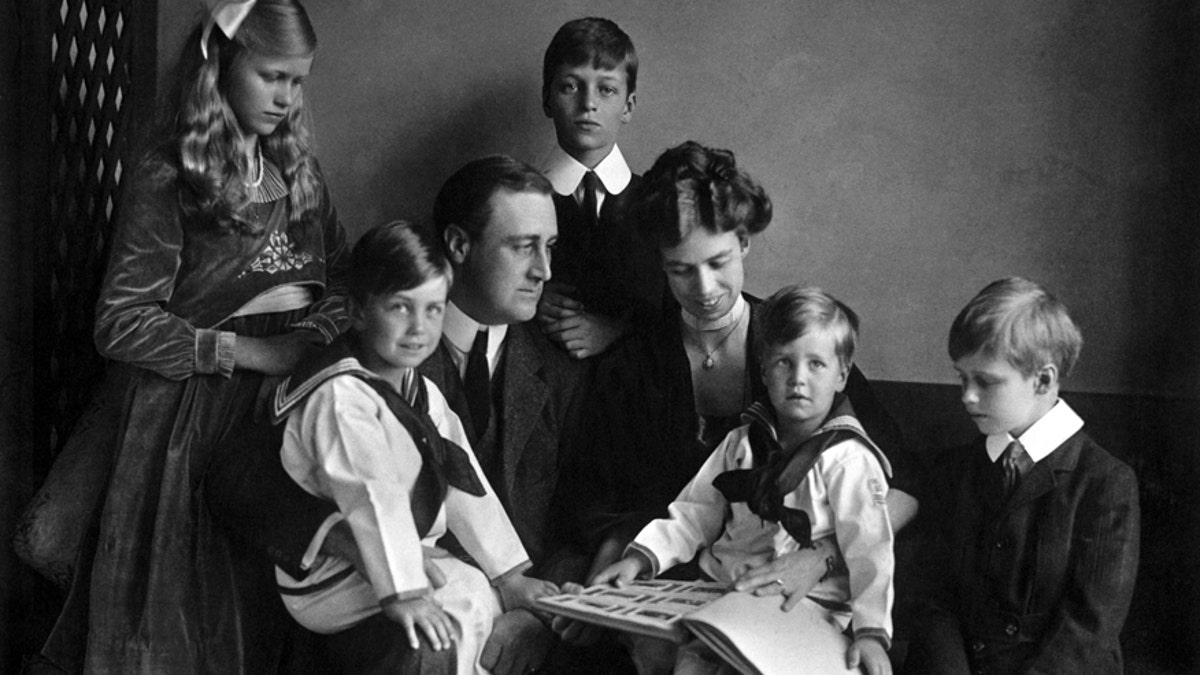
In this June 12, 1919 photo provided by PBS, Franklin and Eleanor Roosevelt pose for a portrait with their children in Washington. (AP)
Behold this saga of bygone titans, a trio on an epic scale who share the same name.
The latest magnum opus from Ken Burns, "The Roosevelts: An Intimate History," premieres on PBS as a seven-night, 14-hour extravaganza airing Sunday through Saturday (Sept. 14-20) at 8 p.m. EDT.
It is a story that takes a holistic view of greatness, interweaving Theodore Roosevelt, the nation's 26th president and a Republican; his fifth cousin, Franklin Delano Roosevelt, a Democrat who was elected four times to the White House as the 32nd president; and TR's niece, Eleanor Roosevelt, who wed FDR, and, even beyond the unique partnership they forged with marriage, lived a life of activism and moral leadership that extended nearly two decades after his death.
"The Roosevelts" thus spans a century, from TR's birth in 1858 through Eleanor's passing in 1962, at age 78. Not only are these three lives intertwined but, as Burns' rich portrayal demonstrates, they are inseparable from the history of the early 1900s, notably World War I, the Great Depression and World War II.
If you have ever seen a Ken Burns documentary, you know what to expect here: a leisurely pace; lyrical writing (by frequent Burns collaborator Geoffrey C. Ward); a bursting archive of photos and film clips; a gallery of talking heads (among them Doris Kearns Goodwin, George Will and Ward himself); sonorous narration (by Peter Coyote); the words of its major figures recited, in character, by notable actors (Meryl Streep voices Eleanor).
The stately Burns formula is as predictable as the tides, perhaps too much so by now. But its robust ritual serves the Roosevelts well.
Here were three individuals who, for varying reasons, couldn't sit still with the privilege they were born into.
TR, sickly as a youth, became a champion of physical exertion and boundless activity, in part to outrun the depression that plagued him for a lifetime. (An illuminating early entry from his journal: "Black care rarely sits behind a rider whose pace is fast enough.")
By contrast, FDR, after a promising start in public service, was robbed of the ability to outrun his demons: He was stricken with polio at age 39 and then compelled to face and defy this affliction which he did with a public smile of confidence, as told in Part Four, perhaps the series' most affecting episode.
Eleanor also had her battles, beginning in childhood with the death of both parents. Raised by her maternal grandmother, she was dismissed for her homeliness and tagged with the nickname "Granny." Her life became a campaign of proving herself and eventually charting a course beyond the powerful pull of FDR, whom she had wed at 20.
Detailing the ways in which the Roosevelts helped shape events and transformed the nation calls for many hours of screen time, and this series is equipped to provide them.
How profoundly did a Roosevelt change America? Leave it to commentator George Will, who declares, "Prior to Franklin Roosevelt, the assumption was that the federal government existed to produce the conditions for the pursuit of happiness. Frank Roosevelt said, 'Why stop there?'" Reaching several steps further, FDR wanted government to do nothing less than "deliver happiness," says Will, "in the form of material wealth."
Such a vision will thrill some citizens and appall others. But "The Roosevelts" should leave everyone, whether approving or not, in wonder at all this threesome did. It may also stir dismaying thoughts about the current politicians the Roosevelts dwarf.






